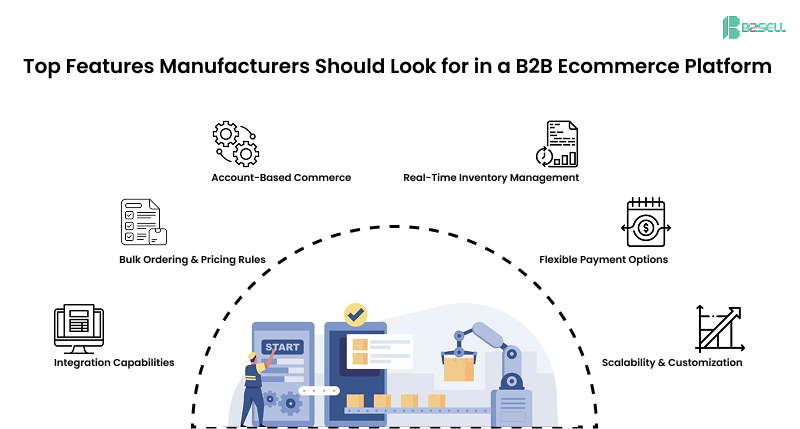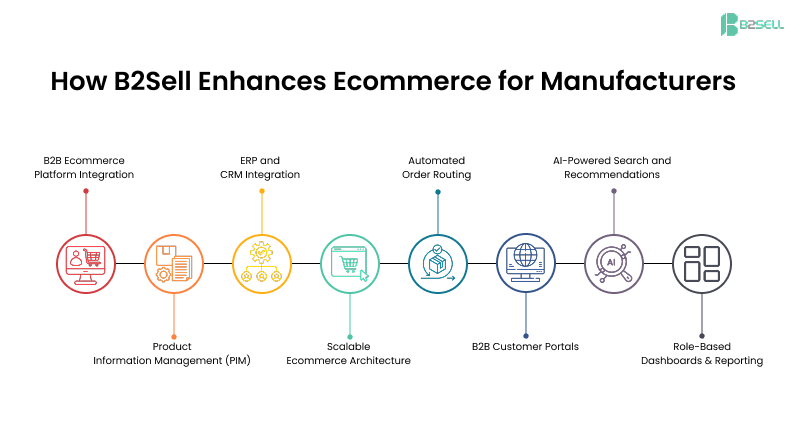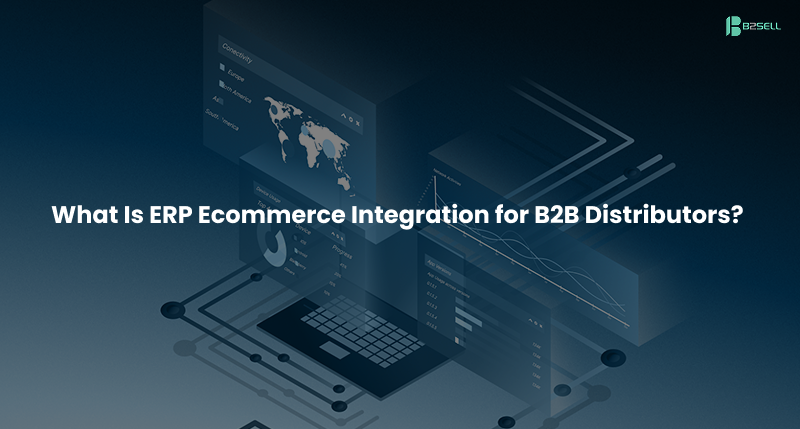Introduction: Why Ecommerce for Manufacturers Is Booming in 2026
The digital shift in manufacturing is no longer optional—it's a necessity. With global supply chains evolving, customer expectations rising, and B2B buyers demanding seamless digital experiences, manufacturers must adopt robust ecommerce for manufacturers strategies to stay competitive. Gone are the days of faxed purchase orders and manual catalogs. Today, modern B2B ecommerce solutions enable manufacturers to streamline operations, expand markets, and boost customer loyalty.
Whether you're a large-scale manufacturer looking to digitize your sales process or a mid-sized company ready to explore new digital sales channels, this ultimate guide will walk you through the best ecommerce platforms, features to look for, success strategies, and how B2Sell can power your transformation.
What Is Ecommerce for Manufacturers?
Ecommerce for manufacturers refers to digital platforms and solutions that allow manufacturers to sell products directly to distributors, wholesalers, retailers, or even end customers through online channels. Unlike traditional retail ecommerce, B2B ecommerce for manufacturers often involves bulk pricing, negotiated contracts, tiered discounts, and integration with ERP, CRM, and PIM systems.
Key Concepts:
- B2B product catalogs with technical specs
- Custom pricing for different buyer segments
- Self-service portals for orders and reorders
- Integration with manufacturing and inventory systems
✅ Key Benefits of Ecommerce Platforms for Manufacturers
The manufacturing world is evolving fast—and ecommerce is no longer a “nice to have.” It's become a must-have growth strategy. Whether you're producing industrial equipment, auto parts, or food packaging materials, a well-structured ecommerce setup can transform the way you operate. Here’s how:
%C2%A0.png)
1. Reach More Customers Without Expanding Your Sales Team
With an ecommerce platform, you can sell beyond your existing network—whether that means across the country or globally. Your website becomes your 24/7 salesperson, helping you reach new customers without increasing headcount.
2. Automate the Tedious Stuff
Say goodbye to manually entering orders from phone calls, emails, or faxes. With automation, orders go directly from your online store to your ERP system, inventory, and shipping queue—all without lifting a finger.
3. Give Buyers a Personalized Experience
No two buyers are alike. Whether it's pricing, payment terms, or product access, a great B2B ecommerce platform lets you customize the experience for every customer, which helps build trust and loyalty.
4. Keep Your Product Info Spot-On
With a multichannel ecommerce platform, all your product details—photos, specs, inventory—stay consistent across every touchpoint. That means no more confusion, and fewer returns or complaints.
5. Make Smarter Decisions With Better Data
You can’t improve what you don’t measure. Ecommerce platforms provide powerful dashboards to track your top products, customer buying habits, and trends, helping you stock smarter and plan ahead.
6. Improve Customer Relationships
Customers love self-service. Let them log in, check past orders, reorder, or download invoices—whenever they want. That allows your sales team to concentrate on building strong customer relationships instead of getting bogged down in paperwork.
That allows your sales team to focus on building relationships instead of getting bogged down by paperwork.
🔍 Top Features Manufacturers Should Look for in a B2B Ecommerce Platform
When selecting a B2B ecommerce platform, manufacturers should prioritize the following:

a. Integration Capabilities
- ERP (e.g., SAP, NetSuite, QuickBooks) for seamless backend sync
- CRM (e.g., Salesforce) to track leads and manage customer interactions
- PIM (Product Information Management) helps centralize and enhance product content for consistent delivery across all channels.
b. Bulk Ordering & Pricing Rules
- Quantity-based discounts for large-volume buyers
- Contract-specific pricing and tiered rates for loyal or high-value customers
- Automated quote generation and price negotiation features
c. Account-Based Commerce
- Buyer-specific catalogs tailored to each client’s contract terms
- Role-based access and approval workflows for enterprise purchasing teams
- Purchase history tracking to enable quick reorders and tailored upselling
d. Real-Time Inventory Management
- Real-time stock visibility across warehouses and manufacturing units
- Automated restocking alerts and backorder notifications
- Integration with production planning systems for on-demand manufacturing
e. Flexible Payment Options
- Support for net terms, credit card, ACH, purchase orders, and invoicing
- Integration with payment gateways for secure transactions
- Custom billing cycles and credit limits for B2B clients
f. Scalability & Customization
- Capable of managing thousands of SKUs, buyers, and user roles with ease and scalability.
- Flexible API-based architecture for future integrations
- Modular features to grow as the business evolves
Best Ecommerce Platforms for Manufacturers in 2026
1. Magento Commerce
A powerful, open-source B2B ecommerce platform ideal for large manufacturers with complex workflows. Magento offers strong integrations, customizations, and multichannel commerce features.
2. BigCommerce B2B Edition
Offers out-of-the-box B2B features like quote management, shared shopping lists, and punchout capabilities. Ideal for mid-sized manufacturers.
3. Shopify Plus
Renowned for its user-friendly interface and rapid deployment capabilities.It can handle B2B with additional apps and customization.
4. OroCommerce
Designed specifically for B2B ecommerce, OroCommerce supports customer segmentation, workflow automation, and personalized experiences.
5. NetSuite Commerce
Part of Oracle, this unified ERP and ecommerce system is built for manufacturers who need a strong backend with ecommerce flexibility.
6. B2Sell Ecommerce Integrations
B2Sell offers powerful ecommerce integration solutions that connect ERP, CRM, PIM, and ecommerce platforms. Ideal for manufacturers seeking a unified digital commerce ecosystem.
Multichannel vs Omnichannel Ecommerce: What Manufacturers Need to Know
Multichannel Ecommerce Platform
Allows manufacturers to sell on multiple channels (website, marketplaces, portals) but data may not always sync in real-time.
Omnichannel Commerce
Provides a seamless experience across channels with unified product, customer, and order data. Ideal for manufacturers who want:
- Centralized inventory
- Unified customer records
- Consistent product data across all touchpoints
B2Sell enables both multichannel and omnichannel strategies through its seamlessly integrated solutions.
Real-World B2B Ecommerce Examples
Example 1: Industrial Parts Manufacturer
- Challenge: Managing 20,000 SKUs across dealers
- Solution: Magento + B2Sell PIM
- Result: 45% faster order processing, 30% drop in errors
Example 2: Chemical Manufacturer
- Challenge: Complex quoting and contract pricing
- Solution: OroCommerce + B2Sell integration
- Result: Self-service portal reduced sales team workload by 40%
Example 3: OEM Electronics Manufacturer
- Challenge: Disparate sales channels
- Solution: Shopify Plus + B2Sell multichannel ecommerce platform
- Result: Unified product data and 24/7 dealer access
How B2Sell Enhances Ecommerce for Manufacturers
B2Sell provides manufacturers with a complete digital commerce infrastructure, including:

1. B2B Ecommerce Platform Integration
Connects with leading platforms like Magento, BigCommerce, Shopify Plus, NetSuite, and OroCommerce to unify the ecommerce ecosystem.
2. Product Information Management (PIM)
Centralize product content to ensure consistency and accuracy across channels. With B2Sell PIM, manufacturers can manage SKUs, technical documents, media assets, and multilingual content in one place.
3. ERP and CRM Integration
Seamless connectivity with SAP, NetSuite, Salesforce, QuickBooks, Infor, and others allows real-time data flow, streamlining sales, finance, and supply chain processes.
4. Scalable Ecommerce Architecture
Support for multichannel and omnichannel commerce ensures your business can expand to new markets and new customer segments without technical hurdles.
5. Automated Order Routing
Configure rule-based routing to assign orders to specific fulfillment centers or manufacturing lines. This helps minimize delays, enhance accuracy, and streamline delivery timelines.
6. B2B Customer Portals
Enable self-service reorders, account management, and real-time product availability. Empower your clients with greater control and visibility, leading to fewer support requests.
7. AI-Powered Search and Recommendations
Use machine learning to improve product discovery, recommend complementary items, and increase average order value.
8. Role-Based Dashboards & Reporting
Offer sales teams, procurement officers, and managers personalized dashboards with KPI tracking, quote statuses, order trends, and inventory insights.
FAQs About Ecommerce for Manufacturers
What is the best ecommerce platform for manufacturers?
Magento and OroCommerce are popular among manufacturers for their flexibility and B2B features. Paired with B2Sell, they become powerful enterprise-grade solutions.
Can a manufacturer sell directly to consumers (D2C)?
Yes, using an omnichannel ecommerce strategy, manufacturers can create separate D2C portals while managing B2B and B2C under the same system.
How does B2Sell improve ecommerce operations for manufacturers?
B2Sell integrates backend systems (ERP, CRM, PIM) with ecommerce platforms, enabling unified data management, better automation, and faster time-to-market.
Is it expensive to implement ecommerce for manufacturers?
Costs vary based on scale and needs. However, with platforms like B2Sell offering modular integration, manufacturers can start small and scale affordably.
Conclusion: Future-Proof Your Manufacturing Business with Ecommerce
The future of manufacturing is digital—with ecommerce serving as its foundation.With the right B2B ecommerce platform, robust multichannel ecommerce platform support, and strategic integration via B2Sell, manufacturers can:
- Boost efficiency
- Improve customer satisfaction
- Expand into new markets
- Future-proof their operations
Whether you're starting your ecommerce journey or looking to upgrade, B2Sell empowers manufacturers with scalable, flexible, and AI-ready ecommerce integrations.
Ready to Transform Your Ecommerce? - Book a demo


.png)




.png)